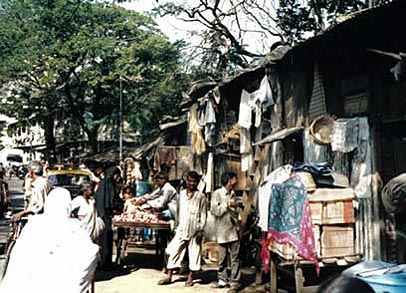Casestudy 05India
Counting the invisible: The census of pavement dwellers in Mumbai
- description
- further information

© Patrick Wakely
This case shows how, from a joint investigation on pavement dwellers in the city of Mumbai, the NGO Society for the Promotion of Area Resource Centres (SPARC) together with Mahila Milan (Women Together), an organization of women pavement dwellers, and the National Slum Dwellers Federation developed an approach to gathering information in the form of socio-economic statistics and life histories, which proved crucial in helping them improve their situation. This led to the creation of an information base on the pavement dwellers and established within SPARC and its partners new ways of creating knowledge in partnership with people.
Pavement dwellers are among the poorest and the most vulnerable urban dwellers in India. Most have no choice but to live on the pavements because of the high cost and low availability of formal housing, especially in cities such as Mumbai, and the fact that they cannot afford public transport and thus need to live at a short distance from places where they can get work. They face constant threats of having their homes demolished and their valuables confiscated. Most are refused access to ration cards since they have no permanent address and they lack the income to supply themselves with food and fuel on a daily basis.
SPARC started its work in the area of Mumbai with the largest concentration of pavement families. The NGO established the Byculla Area Resource Centre. This provided women pavement dwellers with a space where they could meet and discuss their experiences and perspectives. The women explored ways to break their isolation from the rest of the city and improve their situation. One of the first strategies they elaborated was the organization of an enumeration of the pavement families living in the Byculla area in 1985. At that point, the most up-to-date official census only counted registered households and slum dwellers but ignored the pavement dwellers, thus effectively excluding them from the arena of public policy and service provision.
The survey involved pavement dwellers who had organized themselves in groups and communities with support from SPARC and the help of trained personnel. It covered over 6,000 households, accounting for nearly 27,000 people. The results and findings, which were published by SPARC, enabled pavement dwellers to be formally recognized and visible to the authorities and the rest of the city. The information helped to improve awareness of the pavement dwellers, their needs and conditions. It set the advocacy base for policy change in favour of the urban poor and the official recognition of pavement dwellers.
The enumeration additionally improved self-confidence within pavement dweller communities. Before the census, pavement dwellers had typically formed support networks on the basis kinship, ethnicity, language, geographical origin and so on. The census created a new, parallel identity, helping pavement dwellers to feel part of the larger community of the urban poor.
Community-led censuses and surveys have today become one of the main strategies promoted by SPARC and their partners for community mobilization and public advocacy. They have proved an important tool for building communities’ capacity to articulate their knowledge on their own situation and the situation of those with whom they interact. They have been crucial in initiating and sustaining effective processes of poverty alleviation in urban areas.Go back to case studies listing
Sundar Burra (SPARC)
Mumbai 400 026
India
+91 22 2385 8785
